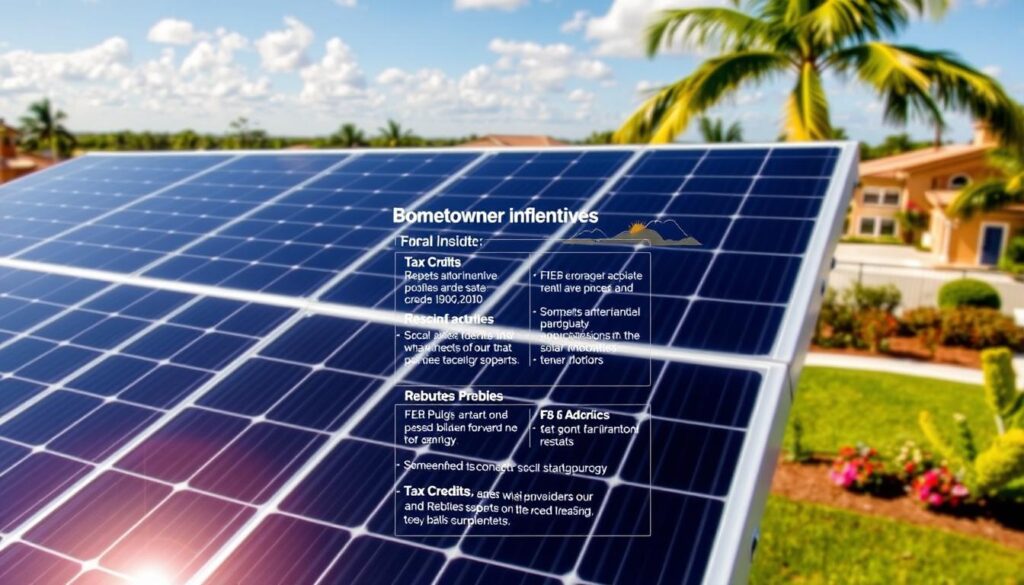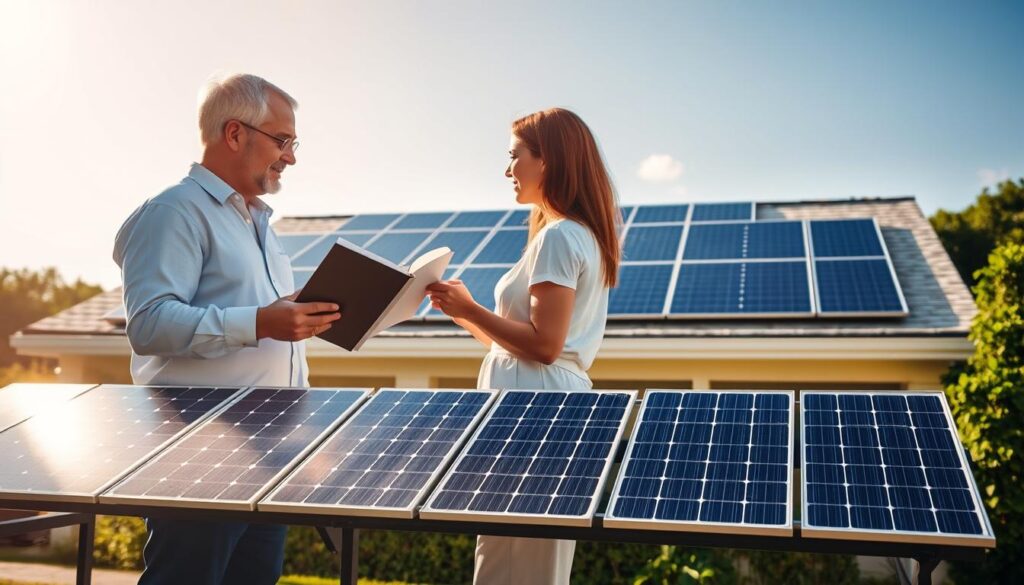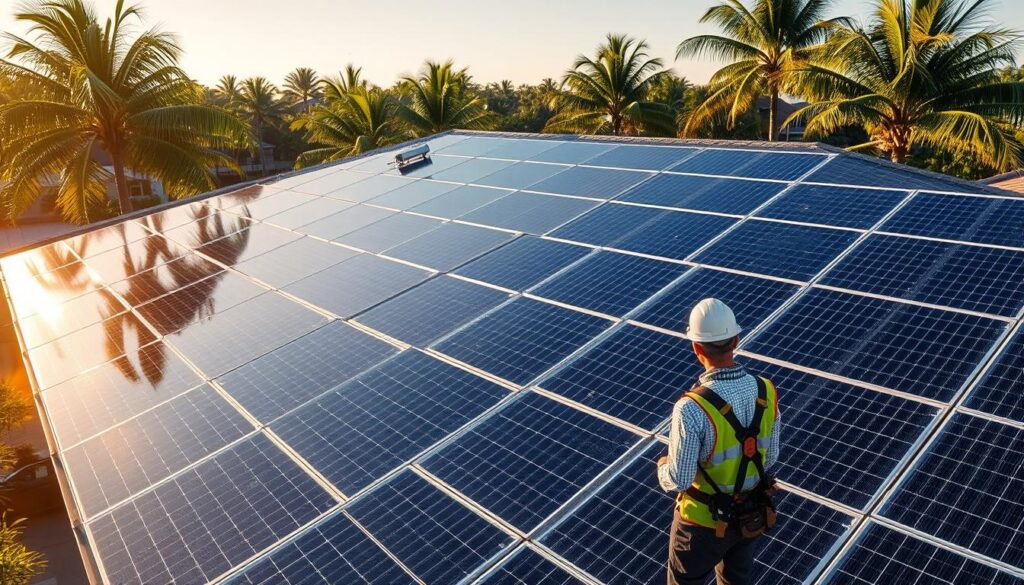Solar panels florida homeowners insurance plays a key role in protecting your investment in solar energy Florida. Installing solar power for homeowners offers long-term savings and environmental benefits, but it’s crucial to understand how your policy adapts. With the average system costing around $21,000 post-tax credits, proper coverage ensures your panels endure hurricanes, hail, and other threats common in Florida.
Florida’s sunny climate makes solar energy Florida a smart choice, yet homeowners must review policies. Most insurers cover damage from storms or vandalism, though exclusions like earthquake damage may apply. Regular inspections and updated coverage limits help manage costs, balancing the 25–30 year lifespan of panels with liability risks like net metering disputes.
Key Takeaways
- Homeowners insurance typically covers solar panels attached to roofs, but check for storm-related exclusions.
- Average solar panel system cost in Florida is $21,000 after federal credits, affecting insurance premiums.
- Florida’s climate requires policies to address hurricane, hail, and wind risks for solar power installations.
- Annual inspections and updated coverage limits protect against costly repairs or replacements.
- Some insurers may offer discounts for solar panels, offsetting premium increases.
Understanding the Benefits of Solar Panels for Homeowners
For homeowners exploring solar power for homeowners, solar energy Florida provides a compelling mix of financial, environmental, and long-term advantages. Let’s break down why Florida residents are increasingly turning to this renewable energy solution.
Cost Savings on Energy Bills
- Florida’s sunny climate maximizes solar production, slashing monthly utility costs by up to 30%.
- Net metering policies let you earn credits for excess energy sent to the grid, lowering bills further.
- Many insurers in Florida offer renewable energy insurance options that bundle discounts with energy-efficient upgrades.
Environmental Impact
Solar panels cut carbon emissions by replacing fossil fuel energy. A 2023 study found solar installations in Florida reduced CO2 output by 12 million tons annually.
“Solar adoption aligns with Florida’s climate goals, protecting coastal ecosystems from pollution,” said the Florida Solar Energy Center.
Increase in Property Value
Studies show homes with solar panels sell 20% faster and gain 4-6% in equity. Buyers in Florida prioritize energy independence, making solar a top selling point. Agents report higher appraisals for properties with solar energy Florida systems, ensuring strong ROI over time.
Florida’s Solar Incentives and Rebates
Florida homeowners can unlock major savings through solar energy Florida programs. Let’s break down how these Florida solar panel incentives simplify solar panel installation in Florida.

Federal Tax Credit
- 30% federal tax credit covers installation costs (e.g., $9,000 saved on a $30,000 system)
- Applies to systems installed through 2032; expires gradually after 2034
- Credits reduce tax liability dollar-for-dollar
State Incentives
Solar energy Florida residents gain extra perks like:
- Sales tax exemption (saving 6% on purchases)
- Property tax exemption—no valuation increase for solar systems
- Net metering credits for excess energy sold back to utilities
Local Programs in Florida
Counties like Orlando offer:
- OUC rebates in the Orlando area
- Expedited permitting processes
- Discounts for community solar projects
| Incentive Type | Federal | State | Local |
|---|---|---|---|
| Tax Credit | 30% of system cost | N/A | N/A |
| Sales Tax Exemption | N/A | 6% saved | N/A |
| Net Metering | N/A | Full energy credit | Varies by utility |
These programs cut upfront costs by thousands. For example, a $10,548 5kW system drops to $7,384 with federal credits. Pair incentives with Florida’s 25+ year solar lifespan for long-term savings.
How Homeowners Insurance Works with Solar Panels
Standard solar panels florida homeowners insurance policies in Florida cover rooftop solar systems as part of a home’s structure. This means basic protections for fire, theft, or vandalism typically apply. However, gaps exist: some insurers exclude wind or hail damage, requiring separate renewable energy insurance options for full coverage. Homeowners must review policies to ensure their system’s value—averaging $15,000–$25,000—is adequately insured.
https://www.youtube.com/watch?v=H54yJI6Ql38
Coverage for Solar Equipment
Most carriers include solar panels under standard insurance coverage for solar panels, but specifics vary. Check if your policy covers:
- Physical damage from storms or accidents
- Theft or vandalism
- Repairs after covered incidents
Note: Wind or hail damage may require supplemental coverage. Leased systems often require coordination with the leasing company to confirm who holds liability.
Liability Considerations
Florida’s tiered system requires systems over 10 kW (Tier 2) to have a $1 million liability policy, costing around $200 annually. No claims have been filed against inverters under 1 MW, but verify local utility requirements. Lessees may still need personal coverage if the provider doesn’t insure their system.
Potential Policy Adjustments
After installing solar panels, update your policy’s dwelling coverage to reflect increased home value. Higher limits may slightly raise premiums but ensure full replacement cost coverage. Some insurers offer discounts for solar installations, balancing costs with safety investments.
Choosing the Right Homeowners Insurance Policy
Selecting the ideal solar panels florida homeowners insurance plan requires careful evaluation of your system’s size and policy specifics. Start by reviewing your solar array’s tier classification, as Tier 2 and 3 systems may need specialized coverage. 
“Homeowners in Pensacola are encouraged to obtain quotes from multiple insurance companies to compare coverage and pricing for solar panel insurance.”
Factors to Consider
- Replacement cost vs. actual cash value: Opt for replacement cost coverage to avoid depreciation deductions.
- Tier requirements: Tier 2 systems (over 10kW) need a Personal Liability Policy (PLP) with at least $1M coverage.
- Endorsements: Add clauses for green upgrades to ensure compliance with LEED or USGBC standards.
Comparing Providers
When evaluating insurers like Gulf Coast Insurance, ask:
- Do you offer insurance coverage for solar panels under standard policies?
- Are there homeowners insurance discounts for solar panels available?
- What are the deductibles for storm or lightning damage?
Common Exclusions
Review policies for gaps like:
- Exclusions for gradual wear and tear on panels
- Limitations on electrical system failures
- Damage from pre-existing roof issues
Florida’s green policies and tiered system require proactive research. Start by assessing your system’s size, then compare insurers offering tailored renewable energy coverage.
Impact of Solar Panels on Homeowners Insurance Rates
Thinking about installing solar panels? Many Florida homeowners worry about insurance costs. While premiums might rise slightly, the benefits often outweigh the changes. Let’s break down how solar systems affect policies.
Factors Affecting Insurance Premiums
- Roof-mounted systems are usually covered under standard insurance coverage for solar panels as part of the dwelling.
- Ground-mounted or detached panels may require add-ons or separate policies.
- Florida’s wind zones and installation quality impact risk assessments.
- Higher system costs could increase coverage limits, affecting premiums.
Discounts for Renewable Energy
Many insurers offer homeowners insurance discounts for solar panels to offset premium changes. Look for:
- “Green” discounts for energy-efficient upgrades.
- Special programs for storm-resistant solar systems.
- Providers like Allstate and Florida Peninsula Insurance often provide tailored incentives.
“Solar installations can reduce long-term energy costs, balancing any premium increases.”
Updating Your Insurance After Installation
After installation, contact your insurer to:
- Notify them of the system’s details (brand, cost, installation date).
- Verify solar panels florida homeowners insurance coverage for storm damage or theft.
- Review liability limits—some policies cap coverage at $500,000, but solar may require higher limits.
Renew policies annually to ensure coverage keeps up with system value and local risks like hurricanes.
Steps to Install Solar Panels in Florida

Starting your solar panel installation in Florida involves careful planning. This guide breaks down the key steps to ensure compliance with local codes and align with your solar panels florida homeowners insurance needs.
Finding a Reliable Solar Installer
Choose licensed installers certified by the Florida Solar Energy Industries Association (FSEIA). Look for companies providing proof of insurance and warranty details. Reputable installers like SunPower or Seminole Electric ensure systems meet safety standards, reducing risks to your property and insurance claims.
Permits and Regulations in Florida
Before installation, secure permits from your county. Florida requires solar panels to withstand winds up to 140 mph. Systems must also comply with net metering rules limiting production to 110% of your home’s average usage. Here’s how tiers affect insurance:
| Tier | Power Capacity | Insurance Requirements |
|---|---|---|
| Tier 1 | ≤11.7 kW | No extra insurance needed |
| Tier 2 | 11.8–100 kW | $1M umbrella policy required |
| Tier 3 | >100 kW | Custom underwriting by insurer |
Timeline for Installation
- Planning & Permits: 2–6 weeks (includes HOA approvals)
- Installation: 1–2 days on-site work
- Inspections: Final check within 1 week post-installation
After installation, update your solar energy Florida policy details. For example, a 34-kW system’s owner saw premiums drop $1,100 annually after proving system durability. Always confirm coverage updates with insurers like State Farm or Allstate before finalizing.
Common Myths About Solar Panels and Insurance
Myths about solar energy and insurance often hold homeowners back. Let’s tackle the top three misunderstandings to clear the way for smarter decisions.
| Myth | Reality |
|---|---|
| Solar panels raise insurance premiums | Many insurers like State Farm and Allstate offer homeowners insurance discounts for solar panels, often balancing or reducing costs. |
| Insurance covers only basic damage | Florida policies can extend coverage with endorsements. Most solar panels florida homeowners insurance providers include storm and fire damage. |
| Renters can’t access solar benefits | Renters benefit via solar panel leasing in Florida or community programs, even without owning property. |
Florida’s sunny climate and strong incentives make solar a smart choice. For instance, the federal tax credit cuts costs by 30%, while homeowners insurance discounts for solar panels offset premiums further. Check with insurers like Allstate to confirm coverage details.
- Florida’s net metering laws add value by letting homeowners sell excess energy.
- Leasing programs simplify costs, requiring no upfront investment.
Myths like higher costs or limited options don’t hold up. With proper research, Florida residents unlock savings and security.
Preparing for a Solar Panel Installation
Before starting solar power for homeowners in Florida, proper preparation ensures long-term savings and safety. A professional assessment checks roof age, shading, and structural integrity to support panel weight. Florida’s building codes require systems withstand winds up to 130 mph in coastal areas, so installers must verify compliance with local regulations.
“The average residential solar panel system costs between $15,000 and $25,000.” — Center for Sustainable Energy
Home Assessment Requirements
Installers evaluate:
- Rooftop tilt and orientation for optimal sun exposure
- Electrical panel capacity to handle added energy production
- Local permitting requirements for Florida solar panel incentives
Necessary Upgrades or Repairs
Common fixes include:
- Rooftop repairs or replacements before panel mounting
- Electrical system upgrades to handle solar-generated power
- Wind-resistant mounting hardware for hurricane zones
Financing Options Available
Florida offers Florida solar panel incentives including tax credits and loans. Compare options below:
| Type | Features | Insurance Notes |
|---|---|---|
| PACE Loans | Long-term financing tied to property taxes | Require proof of system compliance with Florida wind codes |
| Solar Loans | Fixed monthly payments over 5–20 years | No impact on insurance if panels meet safety standards |
| Leases/PPAs | No upfront cost; third-party ownership | Providers often handle insurance but require policy updates |
Proper preparation reduces risks and maximizes benefits of solar panel installation in Florida. Certified installers can help align upgrades with insurance requirements for smoother claims processing.
The Future of Solar Energy in Florida
Florida’s embrace of solar energy continues to shine brighter. With over 4,500 megawatts of solar capacity installed by 2023, the state ranks third nationally in solar power for homeowners. This momentum isn’t slowing down—experts predict a 20% annual growth rate through 2028. As more residents explore solar power for homeowners, innovations in technology and policy will shape this shift.
Growth Trends in Solar Installations
- Florida’s solar market expands as 70% of homeowners now show interest in installing panels.
- Cost reductions and federal incentives, like the 26% tax credit, drive adoption.
- Net metering policies allow homeowners to earn credits for excess energy, boosting savings.
Legislative Support for Solar Expansion
New policies aim to accelerate solar adoption. Lawmakers are updating building codes to encourage solar-ready designs. Insurers now offer renewable energy insurance options tailored to protect systems against storms and wear. Some providers even offer discounts for homes with solar energy Florida setups, recognizing their durability during hurricanes.
Community Solar Projects
Shared solar programs let renters and those unable to install panels access solar benefits. These projects come with unique renewable energy insurance options to cover shared systems. Residents in hurricane-prone areas can now seek coverage that addresses regional risks, ensuring long-term reliability.
Renewing Your Homeowners Insurance After Solar Panel Installation
Updating your solar panels florida homeowners insurance ensures your investment stays protected. After installation, contact your insurer to review insurance coverage for solar panels. Provide documentation like permits, inspection certificates, and equipment details to avoid coverage gaps. Policies may require updates for system value or warranty terms.
Updating Your Policy Information
- Submit final inspection reports to confirm installation safety standards
- Share system specifications like wattage and manufacturer details
- Confirm coverage limits match current system value
Tips for Annual Reviews
“Regular updates keep your solar investment safe against rising risks.”
Check for premium changes—some insurers in Florida have raised rates up to 40%. Compare quotes from providers like Sage Sure or Florida Peninsula Insurance. Review exclusions yearly to ensure storm damage and fire risks are covered under your policy.
Adjusting to Changed Needs
Expanding systems or switching from solar panel leasing in Florida requires immediate updates. Additions like Tesla batteries or ownership transfers must be reported to insurers like American Integrity Insurance. Florida law requires disclosure of system upgrades to maintain coverage validity.
Preparing for Natural Disasters with Solar Panels
Florida’s unpredictable weather demands proactive planning for homeowners with solar panels. solar panel installation in Florida must meet strict hurricane-resistant standards to protect both property and energy systems. Proper preparation ensures your investment stays safe during storms.
Understanding Risks in Florida
Coastal areas face hurricane winds exceeding 140 mph, while inland regions deal with frequent lightning strikes and flooding. Babcock Ranch, powered by over 700,000 solar panels, withstood Hurricane Ian’s 150 mph winds without power loss. However, flooding remains a concern, especially in low-lying regions. Insurance policies must address these risks under insurance coverage for solar panels.
Hurricane Preparedness and Solar Systems
Proper installation is key. Solar panels must be bolted directly to roof rafters and secured with hurricane-rated hardware. Florida codes require systems to withstand winds up to 160 mph. Regular inspections before hurricane season can identify loose mounts or roof damage. The National Renewable Energy Laboratory reports only 0.1% of solar systems showed yearly damage from 2009–2022, proving their durability.
Insurance Considerations for Storm Damage
solar panels florida homeowners insurance policies often cover wind and hail damage but may exclude flood or earthquake damage. Review your policy to confirm coverage limits. Document your system with photos and warranties. For ground-mounted panels, confirm they’re classified as part of your home’s structure for full coverage. Contact your insurer to adjust deductibles if your system exceeds policy limits.
- Verify windstorm coverage for roof-mounted systems
- Confirm flood insurance through the National Flood Insurance Program
- Update policies annually to reflect system upgrades
By aligning installation standards with insurance requirements, homeowners can protect both their investment and energy supply during storms.
Resources for Florida Homeowners Considering Solar Panels
Florida’s rise as a solar leader makes access to reliable resources critical for informed decisions. Start by exploring Florida solar panel incentives through local and state programs. Here’s where to find tailored guidance:
Local Government Resources
County and state offices, like the Florida Public Service Commission, provide guides on permits, Florida solar panel incentives, and net metering policies. Check local websites for solar installer licensing requirements and hurricane-resistant installation standards. Contact regional agencies to confirm insurance compliance for systems over 10kW requiring Tier 2 coverage.
Nonprofits and Advocacy Groups
Groups like the Florida Solar Energy Center offer free guides on insurance requirements and maintenance tips. The Florida Solar Energy Industries Association (FSECIA) connects homeowners with insurers like Progressive or Citizens Property Insurance Corporation that cover solar systems. They also highlight which providers exclude hurricane damage or mandate higher deductibles for coastal areas.
Online Tools and Calculators
Use tools like DSIRE’s database to compare solar panel leasing in Florida options and incentives. The U.S. Department of Energy’s PVWatts calculator estimates energy savings. Insurance comparison sites like Policygenius let users input system specs to find policies covering wind damage or theft. Check your utility’s website for solar energy Florida interconnection requirements and PLP documentation steps.
Florida’s solar journey starts with these resources. Visit official sites to explore tax exemptions, disaster recovery programs, and installer reviews. Prioritize providers offering windstorm coverage and discounts for eco-friendly upgrades. Let these tools guide your path to a sustainable, insured solar-powered home.
